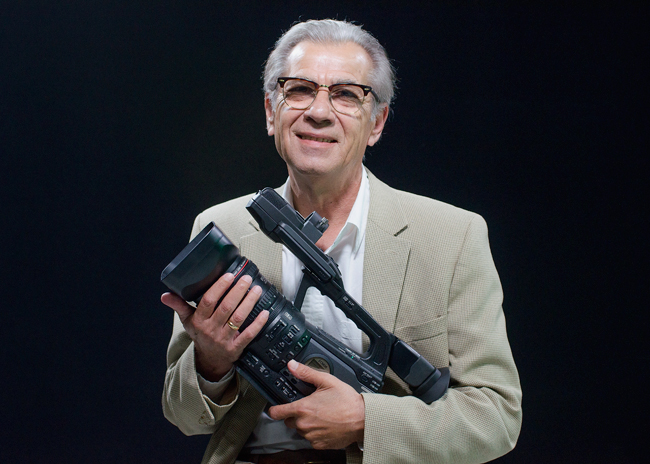Department Chair, Filmmaker Explores 'Painful' Genealogy In Nazi Documentary
Aug. 23, 2013
SHSU Media Contact: Jennifer Gauntt
Story By: Kim Kyle Morgan

Update: Since this story was written, Ladislaus Csatary has died.
When reporters knocked on the door of a two-bedroom apartment in Budapest, Hungary, in July 2012, a 97-year-old man clad only in a shirt and underwear cautiously peered out. He seemed frail, far from the accused Nazi war criminal the Czechoslovakian government claimed he was.
But it was indeed Ladislaus Csizsik-Csatary, a former police commander who was in charge of a Jewish ghetto in Kassa—now renamed Kosice—during World War II. Csatary is said to have sent 15,700 Jews to their death at Auschwitz.
Csatary eluded capture all these years, until Operation: Last Chance. Launched in 2002 by the Simon Wiesenthal Center, the mission is to bring Nazi war criminals to justice before they die.
Operation: Last Chance was also the last chance for Sam Houston State University professor Jean-Richard Bodon to find out what happened to his family.
"My family was from the town that Csatary was the leader of," said Bodon, chair of SHSU's Department of Mass Communication. "When I found out they captured him, it was very strange because I thought he had been dead for a long time."
Bodon, an independent filmmaker who's been working with the Simon Wiesenthal Center to document the capture of Nazi war criminals targeted by Operation Last Chance, grabbed his video camera and headed overseas.
"Participating in the process of putting Csatary on trial feels kind of strange, but I feel like I owe it to all of the families who suffered," Bodon said. "There is a sense of closing a chapter of my own family's past as well."
Bodon knows that at least one cousin of his father's spent time in a concentration camp, but he knows very little about how he or other family members escaped. Just knowing they were under the rule of Csatary is horrifying enough.
"The entire experience has been like doing genealogy," Bodon said, "but in a painful way."
Final touches
The 52-minute Operation: Last Chance was released in mid-April and was picked up by the distributor Doc & Film International for international audiences.
Bodon spent several weeks in the edit suite, working his way through some 60-hours of footage, some of it shot by his colleague Tom Garrett, SHSU associate professor of mass communication.
"Normally, in a documentary, you talk about history," Garrett said. "But viewers get to go on a journey with Jean. That's the neat part about this—the personal connection."
A few others are on the journey with Bodon as well. Kevin Clifton, SHSU associate director of the School of Music, along with his student Joseph Vranas, scored the music for the film; and Thomas Prior, associate chair of the department of theatre and musical theatre, lent his windpipes for the voiceover.
Meanwhile, Bodon's wife Theresa, a multicultural education teacher at SHSU, wrote the script—not an easy job considering the dark, intense nature of the subject. The final product, he said, is extremely graphic, perhaps too graphic for American audiences.
"I like the fact I can displace myself, try to really understand another point of view from another time period," Theresa said. "It really connects us."
That connection began for Theresa the moment she met Bodon on a movie set in Florida when she was just 19-years-old. She was an intern, he was the producer. They've been married 20 years.
"What mostly attracted me to Jean was his interest in history," Theresa said.
Role of a lifetime
Bodon made his way to SHSU from the University of Alabama at Birmingham in 2011, when he was named chair of the department of mass communication. Since then, he's created a master's degree program in digital media and has implemented new tracks of study, including public relations and multiplatform journalism—and, of course, he's still wielding a video camera.
 As an independent filmmaker since 1979, Bodon has clocked more than 500 hours of national television time, 100 hours of prime-time and 800 hours of international television time. His films, documentaries and commercials have earned him numerous awards, and his works have been broadcast on HBO, Showtime, Cinemax, E! and TLC. He is a member of the Directors Guild of America and a judge for the International Emmy Awards.
As an independent filmmaker since 1979, Bodon has clocked more than 500 hours of national television time, 100 hours of prime-time and 800 hours of international television time. His films, documentaries and commercials have earned him numerous awards, and his works have been broadcast on HBO, Showtime, Cinemax, E! and TLC. He is a member of the Directors Guild of America and a judge for the International Emmy Awards.
Furthermore, this former newspaper reporter is still a writer today. In addition to numerous articles and essays, Bodon has written a book about someone he greatly admires—Charlie Chaplin.
"Very strange, but fascinating," Bodon said. "Charlie Chaplin was a director, a composer, a producer, an actor. He did everything in his movies. Some of his movies are almost perfect."
Bodon loves the challenge of trying to make a perfect film, something he's not sure anybody can do—even when the subject is your own family.
In 2006, Bodon produced and released Howling with the Angels, a documentary about his father, Jan.
The synopsis: "In March 1939, Hitler's army marched into Prague, Czechoslovakia. Jan Bodon, a young captain in the Czech Army—who also happened to be blond-haired, blue-eyed and fluent in German—was 'asked' to join the Nazis. He promptly fled and joined the Czech Resistance Movement instead. In this powerful documentary directed by Jan's son, Jean Bodon uncovers the truth not only about Jan's wartime experiences, but also discovers that his father was secretly a Jew in a country which underwent one of the largest extermination campaigns of the war."
Jean Bodon had no idea he was Jewish until he began delving into his father's life.
"I discovered this only 10 years ago; my father died 20 years ago," Bodon said.
Originally from France, Bodon already had an eye for the camera by the time he was 6 or 7. At age 12, fascinated by motion pictures, he made a home movie of his family—dogs, cousins, parents—but never turned the camera on himself.
Bodon still has that footage and ends Operation: Last Chance with original shots of his father. This brings Bodon full circle…and perhaps full closure.
"Documenting all of this, knowing it will live on forever and be there for future generations to learn from, is very fulfilling."
- END -
This page maintained by SHSU's Communications Office
Associate Director: Julia May
Manager: Jennifer Gauntt
Located in the 115 Administration Building
Telephone: 936.294.1836; Fax: 936.294.1834
Please send comments, corrections, news tips to Today@Sam.edu.

 SamWeb
SamWeb My Sam
My Sam E-mail
E-mail

